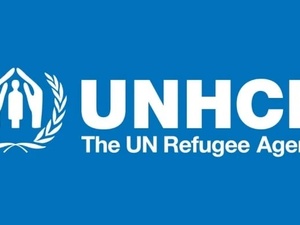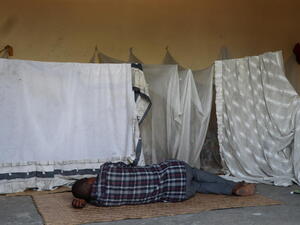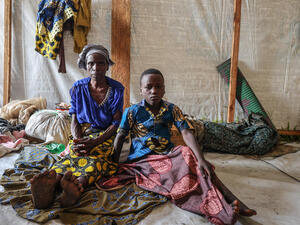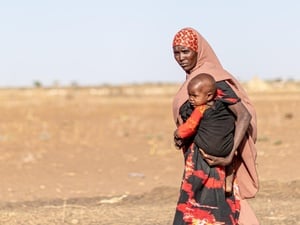Fears increase for Colombia's indigenous communities fleeing violence in their home territories
Fears increase for Colombia's indigenous communities fleeing violence in their home territories

Hundreds of Wounaan indigenous people are arriving in the small Colombian city of Istmina after fleeing violence in their home territory.
ISTMINA, Colombia, April 7 (UNHCR) - For years, they had withstood the presence of irregular armed groups on their territory, the food blockades and the constant fear and intimidation - all for the sake of staying together on their ancestral land. Now, for the first time ever, the Wounaan indigenous people are being forced to flee their territory in Chocó, a vast region stretching for more than 500 kilometres along Colombia's Pacific Coast.
Panic spread through the Wounaan community of Medio San Juan after the murders of two of their teachers in the space of 48 hours last week. Although they had suffered much hardship over the years, it was the first time that an irregular armed group had killed one of their people. Within days, 1,748 people from five Wounaan communities had gathered in their biggest settlement, Unión Wounaan, waiting to make the eight-hour trip upriver to the small city of Istmina.
Ulysses was one of the first to arrive on Monday, on a small boat packed with 36 other people. Still traumatised by what had happened, he explained on behalf of the group how shocking the deaths of the schoolteachers had been to his people.
"The death of any one of us is terrible, but we especially feel the loss of two teachers," he told Philippe Lavanchy, Director of UNHCR's bureau for the Americas, who went to Istmina when informed of the crisis. "To go and study, to become a schoolteacher, this is not an easy thing for us. We have a unique language, only 30% of our children can read, older people are illiterate. To lose two of our teachers is an awful blow and we feel it very deeply."
By Wednesday afternoon, some 400 people had arrived and many more were on their way. Istmina, home to some 12,000 people of mostly Afro-Colombian descent, has little resources of its own and is struggling to cope. Ulysses and more than 70 others have spent their first few nights in the city sleeping in a ruined house by the riverside. The house has no running water, no electricity and no sanitation. The women have started making fires outside, but there is not much food to prepare.
"In addition to security, they need appropriate shelter, they need food and they need clean water," said Philippe Lavanchy, who met the local authorities to ask that the displaced people be provided with adequate assistance. "When dealing with a humanitarian crisis, the response has to be immediate. There are many children here, many pregnant women who cannot be made to wait for help."
Every day, more boats are making their way to Istmina, carrying dozens of frightened people. But there are not enough ships, and not enough gasoline. On Thursday, a boat carrying 200 people was forced to stop for the night downriver from Istmina after running out of gasoline and more than 1,000 people remained in Unión Wounaan, all desperate to flee. In Istmina, concern is growing for those left behind.
"As a man with a family," Ulysses said, sitting on the banks of the San Juan River, "I cannot stop worrying. If we are scared here, what must it be like for them, surrounded as they are? There are old people there, sick people. When I think about that, I cannot sleep at night."
The entire Wounaan population of Medio San Juan, or a total of some 1,748 people in all, is expected to take refuge in Istmina. Forced displacement is especially hard for indigenous people, whose cultures are closely linked to the land they and their ancestors have lived on. Entire communities, with their unique language and culture, are at risk of being wiped out in the Colombian conflict. To avoid this tragedy, UNHCR is working throughout Colombia to help indigenous leaders fight for the right of their people to remain on their territories.
Having been forced to leave their land, the Wounaan are determined to survive as a group. They do not want to be separated and say they do not need houses but must live by the river. The San Juan River, they explain, plays a central role in their culture and they fear they'll lose their identity if they are moved away from the water. And while the present-day situation is cause for much grief and dread, it is fear over the future that gives rise to the worst anxiety among the Wounaan people.
"Our worry is great," Ulysses said. "We do not see how the problem will end. It did not start yesterday but until now no one had been killed. What are we going to do? As long as the armed groups are on our territory, we cannot go back."
By Marie-Hélène Verney in Istmina, Colombia









